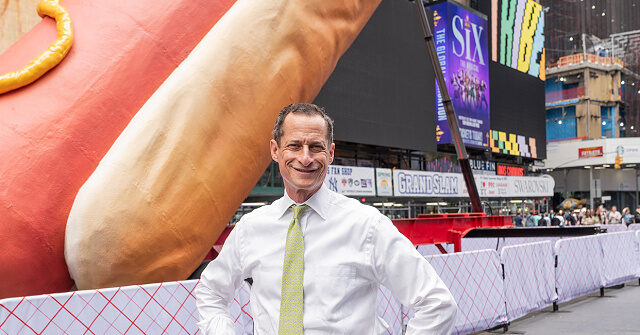Former Congressman Anthony Weiner is making headlines once again as he aims to return to public office by filing candidacy papers to run for the New York City Council in District 2. The announcement, reported by Craig McCarthy, city hall bureau chief for the New York Post, comes after Weiner’s tumultuous past and legal troubles. The former congressman pled guilty in May 2017 to charges involving the sending of obscene material to a 15-year-old girl, leading to a federal prison sentence of 21 months. Upon his release in 2019, Weiner was required to register as a sex offender and also paid a $10,000 fine.
Weiner’s attempt at re-entering the political arena comes as he expresses a desire to return to public service, a sentiment he voiced during his radio show, The Middle with Anthony Weiner on 77 WABC. It was reported that several of Weiner’s friends have encouraged him to consider another run for office. Despite his legal and personal scandals—most notably the sexting scandal that saw him resign from Congress in 2011—Weiner appears to believe he still has a place in politics. His attempts at humor about the situation, such as sarcastically referencing himself as “Mr. Moneybags,” highlight a controversial comeback scene.
The descent of Anthony Weiner from politician to convicted felon began in the public eye with a scandal that erupted in May 2011 when he accidentally posted a lewd image on Twitter. Initially, Weiner claimed to have been hacked, creating a narrative around potential cyber intrusion. However, Andrew Breitbart, the founder of Breitbart News, took it upon himself to reveal the truth by publishing the deleted image, subsequently escalating the scandal. This moment marked a pivotal turning point in Weiner’s political career and ignited massive media attention, leading to a deeper investigation into his online behaviors.
As the scandal unfolded further, additional revelations about Weiner’s sexting habits prompted a press conference in which he finally admitted to having sent the original photo himself. This confession effectively led to his resignation from Congress just days later, as the weight of his actions deemed him unfit for service. Prominent media figures such as William O’Reilly characterized Weiner’s compulsive engagement in politics as a natural inclination, however, they have also expressed that his past actions—particularly his inappropriate messaging with a minor—should serve as deterrents to holding public office again.
Despite the harrowing nature of his past, Weiner’s renewed political ambitions beg the question of redemption and whether voters in New York City would consider him for a position after such significant personal failings. As he returns to the political spotlight, there are numerous challenges ahead, including overcoming public perception and demonstrating his commitment to responsible governance. The complex dynamics of public opinion, particularly surrounding issues of accountability and personal integrity, will undoubtedly play a crucial role in the success—or failure—of Weiner’s campaign.
As the 2023 election cycle begins heating up, Weiner’s political aspirations may ignite debate not only about his personal history but also about broader themes of redemption and second chances within the political landscape. His candidacy will provoke discussions regarding the qualifications needed for public officials and how society weighs past misdeeds against potential future contributions to public service. Thus, Weiner’s bid to reclaim a seat in the New York City Council serves as a pertinent case study on the intersections of personal behavior, public accountability, and the evolving norms surrounding political leadership in an increasingly scrutinizing society.

